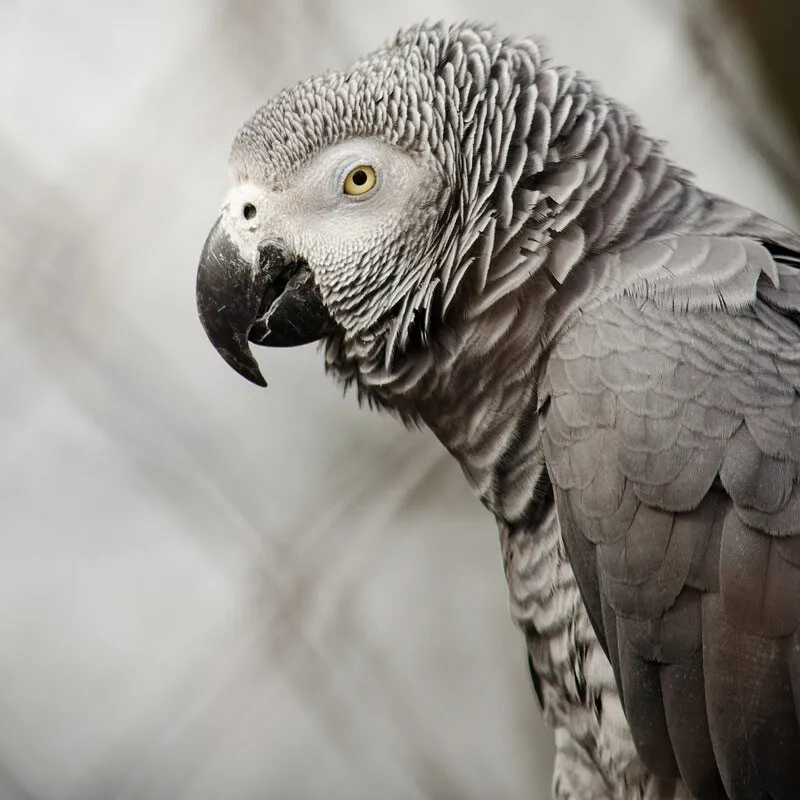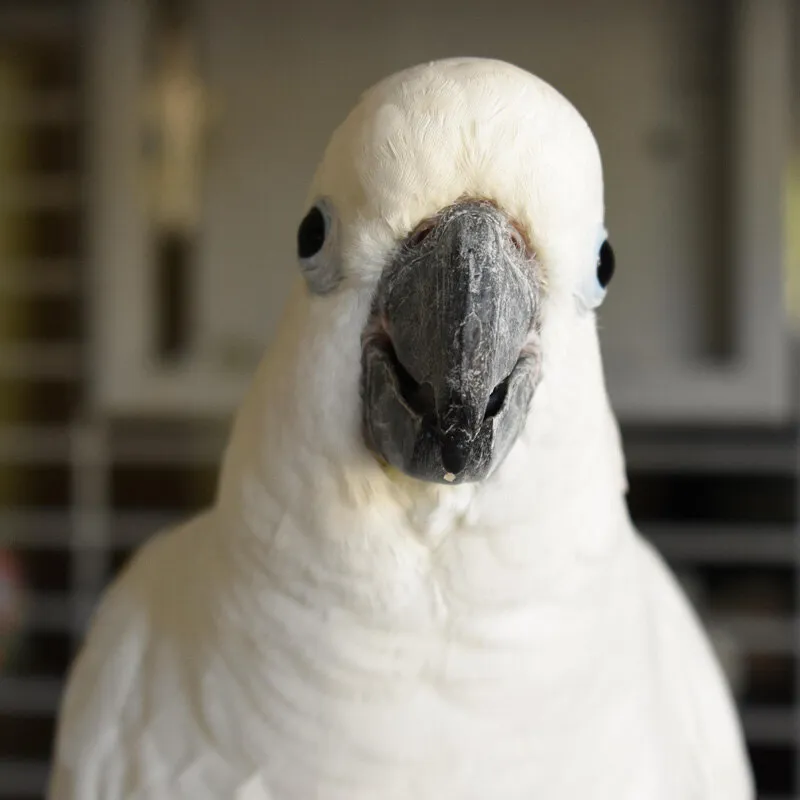Bringing home an intelligent companion like an African grey parrot can be thrilling, but dealing with excessive parrot screaming often leaves owners frustrated. Many parrot owners mistakenly believe their birds are “stupid” for not learning from punishments like cage covering. In reality, behaviors like loud shrieks persist because of accidental rewards we unknowingly provide. This article explores the science behind parrot screaming, using real-life examples to show how simple changes can restore household peace.
Parrot screaming is a common issue among species like African greys, macaws, and cockatoos. These social birds use vocalizations to communicate needs, but without proper intervention, screams escalate. By understanding the ABCs of behavior—A for Antecedent (what triggers it), B for Behavior (the scream), and C for Consequence (the reward)—you can identify and eliminate reinforcements driving the problem.
 Side profile of head and shoulders of an African grey parrot
Side profile of head and shoulders of an African grey parrot
The ABCs of Parrot Screaming
Consider a classic case: An outgoing African grey parrot caged alone in a room starts shrieking piercingly. The owner rushes in, yells at the bird, and covers the cage. From the parrot’s perspective, isolation (A) leads to shrieking (B), which summons the human flock member (C)—a huge reward! This social interaction trumps any mild punishment like the cover.
This pattern repeats across species. A blue-and-gold macaw unleashes window-rattling screams when a teenager returns from school, rewarded with cheese to quiet him. A cockatoo erupts in ear-splitting calls each afternoon as the family reunites, fueled by excited human responses. Parrots, much like dogs or children, thrive on attention, food, or excitement—rewards we overlook.
Humans often project our preferences onto parrots. We hate yelling, so we assume they do too. Yet, many parrots, including my own macaw Sam, relish dramatic interactions. Her flashing eyes and laughter during my rare outbursts were clear clues. According to avian behavior experts, positive reinforcement drives most persistent behaviors, not defiance (source: Association of Avian Veterinarians guidelines on parrot ethology).
Ignoring these dynamics leads to escalation. The key? Analyze patterns meticulously. Track when screaming occurs, what precedes it, and what follows. This reveals hidden reinforcers, empowering you to redesign the environment.
Changing Patterns to Eliminate Screaming
Stopping parrot screaming requires halting accidental rewards while meeting the bird’s needs proactively. Humans must adapt first—often the hardest part. Instead of reacting to screams, prevent them by addressing root causes like boredom, loneliness, or flock reunions.
Case Study: The Shrieking African Grey Parrot
For the isolated African grey, solutions focused on enrichment and consistency. The owner stopped responding to shrieks—no yelling, no covering. Instead, she scheduled 2-3 daily out-of-cage play sessions with toys and interaction. During alone time, foraging toys (e.g., puzzle feeders with nuts or seeds) kept the bird engaged.
She also popped in during quiet moments for calm “hellos,” reinforcing silence. Within weeks, screams dropped as rewards vanished and life improved. This bird’s intelligence shone through once boredom was tackled. Pro tip: Use stainless steel foraging toys recommended by vets to mimic wild scavenging, reducing stress hormones like cortisol.
Case Study: The Cheese-Rewarded Macaw
The blue-and-gold macaw’s screams stemmed from hours alone awaiting the teen. Instructions were straightforward: Upon arriving home, greet the bird immediately, remove from cage, and place on a play gym with a small cheese reward. This preempted screams by fulfilling social needs proactively.
No more waiting for eruptions—direct attention prevented the behavior cycle. The macaw stayed calm, associating the teen’s arrival with positivity. Owners report similar success with other macaws using healthy treats like walnut pieces, aligning with nutritional guidelines from the World Parrot Trust.
 Head and shoulder shot of a cockatoo facing the camera head-on
Head and shoulder shot of a cockatoo facing the camera head-on
Case Study: The Family-Reunion Cockatoo
Cockatoos naturally trumpet flock reunions loudly—a hardwired instinct. The family’s vocal excitement amplified it. A multi-step plan defused energy beforehand: The stay-home mom initiated a pre-arrival “blow-off-steam” session with loud music, screaming play, and a deep soaking bath. Wing-flapping and water tossing tired the bird out.
When the family arrived, all joined a brief, joyful celebration—singing, dancing, controlled noise. This channeled the instinct positively without stifling it. Remarkably, screams diminished, and “celebration time” became a cherished tradition. Vets note baths reduce anxiety in cockatoos by 30-50%, per studies in the Journal of Avian Medicine and Surgery.
Why These Strategies Work Long-Term
In every case, success hinged on two shifts: Cease rewarding unwanted screams and reinforce desired calm. Parrots learn quickly when contingencies align with their social, intelligent nature. African greys boast vocabularies rivaling toddlers; macaws and cockatoos bond deeply with “flocks.”
Owners gained respect for their birds’ smarts, fostering better relationships. Consistency is crucial—slips reinforce old habits. Monitor progress with a behavior journal, consulting an avian vet for underlying issues like illness mimicking screams.
Conclusion: Restore Harmony with Smarter Training
Parrot screaming thrives on accidental rewards like attention or treats. By decoding ABC patterns and proactively enriching lives, you can eliminate it effectively. Whether an African grey, macaw, or cockatoo, these birds deserve environments honoring their wild roots.
Start today: Audit your parrot’s routine, cut scream responses, and add enrichment. For tailored advice, consult a certified avian behaviorist. Your household—and feathered friend—will thank you.
References:
- LafeberVet: African Grey Parrot Species Profile
- Association of Avian Veterinarians: Behavior Modification Guidelines
- World Parrot Trust: Enrichment Recommendations
- Journal of Avian Medicine and Surgery: Studies on Cockatoo Stress Reduction
Read more on parrot care, training tips, and species guides on our site!
